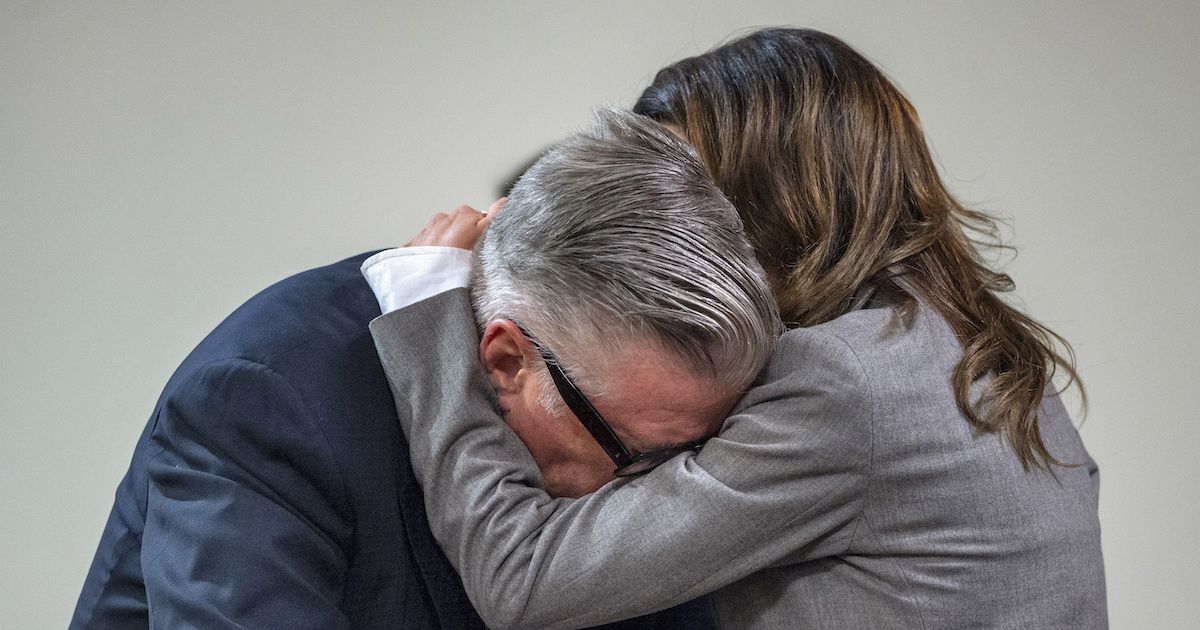SANTA FE, New Mexico.- The nearly three-year judicial saga of Alec Baldwin The trial for the death of a cinematographer ended on Friday without a verdict, but with tears of relief for the actor and a small group of relatives who, throughout the judgmenthad adopted a sombre daily routine on the wooden benches of a windowless courtroom in New Mexico.
By morning, 16 jurors had filed into the courtroom for a third day of taking notes and listening with folded hands to testimony in Baldwin’s manslaughter trial in the death of cinematographer Halyna Hutchins, who was shot while filming the 2021 movie Rust. But the trial took an unexpected turn and they were allowed to leave.
Have a nice weekend, said Judge Mary Marlowe Sommer.
Out of the jury’s view, Baldwin’s criminal case was faltering as his defense attorneys accused local investigators and prosecutors of withholding evidence that could shed light on the unconfirmed origin of the live ammunition used on the Rust set.
It was Baldwin’s fifth day in court. He arrived each morning in a black SUV with his wife, Hilaria Baldwin, to a phalanx of media cameras outside. But early Monday, inside the courtroom, an energetic Baldwin whispered to a lawyer, scribbled on a legal pad and passed notes to his legal team.
The defense scored an early victory when the judge ruled that Baldwin could not be held criminally liable for his role as co-producer on Rust. The case would center on Baldwin’s handling of a gun as a lead actor.
On Tuesday, the defendant’s younger brother, Stephen Baldwin, came to the back of the courtroom for jury selection, which he would return to every day, throughout the day. Of the 70 potential jurors, all but three were familiar with Rust’s case. By the end of the day, the jury consisted of five men and 11 women.
For Wednesday’s opening statements, the courtroom was packed. Half the gallery was reserved for the media — from the local television network to the Times of London, and a few designated photographers. Lawyers and the public filled the other half, some of Baldwin’s friends and family along with curious locals and trial fans.
Sitting in the courtroom, Baldwin looked down at a legal pad, away from the jury, as prosecutors delivered their opening statements and video monitors showed the aftermath of the deadly incident at a ranch on the film set.
According to prosecutors, Baldwin violated basic gun safety rules by pointing a real gun at Hutchins while playing pretend. Defense attorneys argued that Baldwin was just doing his job as an actor, reasonably relying on other professionals to ensure gun safety, albeit with tragic consequences.
Baldwin’s older sister, Elizabeth Keuchler, shed tears in court as testimony was delivered. She greeted her brother with a hug across the courtroom railing and sat close to him from then on.
A prominent Baldwin critic also took her seat in the courtroom: victims’ rights attorney Gloria Allred, who is representing Hutchins’ sister and parents in a civil suit seeking damages.
Baldwin’s every expression during the trial was captured on video broadcast by CourtTV and The Associated Press. During the first full day of testimony, the world-famous actor with a decades-long career in film and television, from “The Hunt for Red October” to “30 Rock” to “Saturday Night Live,” wore a measured, attentive look.
Baldwin left the courtroom once, but otherwise paced slowly and deliberately through the courtroom and general concourse, where impromptu interviews and photographs were prohibited.
On Friday afternoon, Baldwin’s demeanor changed little, but tension was rising in the courtroom, where Marlowe Sommer was weighing a motion to dismiss the case and probing revelations that investigators failed to disclose the receipt of ammunition in March by a man who said it might be connected to Hutchins’ death.
Prosecutors said they considered the ammunition to be unrelated and unimportant, while Baldwin’s attorneys argued it had been buried.
During an afternoon recess, Baldwin took a deep, slow breath as he left the room. The air whistled slightly as he exhaled through pursed lips. Hilaria Baldwin took his arm and rubbed his back as they walked down the hall.
Back inside, attendees chuckled as defense attorney Alex Spiro argued with Rust’s ammunition supplier, Seth Kenney, who established a cooperative relationship with investigators after the shooting.
But the courtroom fell silent amid the clatter of laptop keyboards as the judge questioned a sheriff’s detective about the decision to place the ammunition in an evidence file separate from the Rust shooting case and whether lead prosecutor Kari Morrissey was aware of it.
When you say there were discussions and the decision was made by all of you to put that ammunition in a separate file, was Mrs Morrissey part of that discussion? Marlowe Sommer asked.
Yes, the detective replied.
The case was falling apart. The courtroom gasped as Morrissey acknowledged that his co-prosecutor had just resigned.
Baldwin’s eyes filled with tears, followed by sobs, as the judge delivered her decision, saying, “Approval of dismissal is warranted in this case.”
FUENTE: AP

